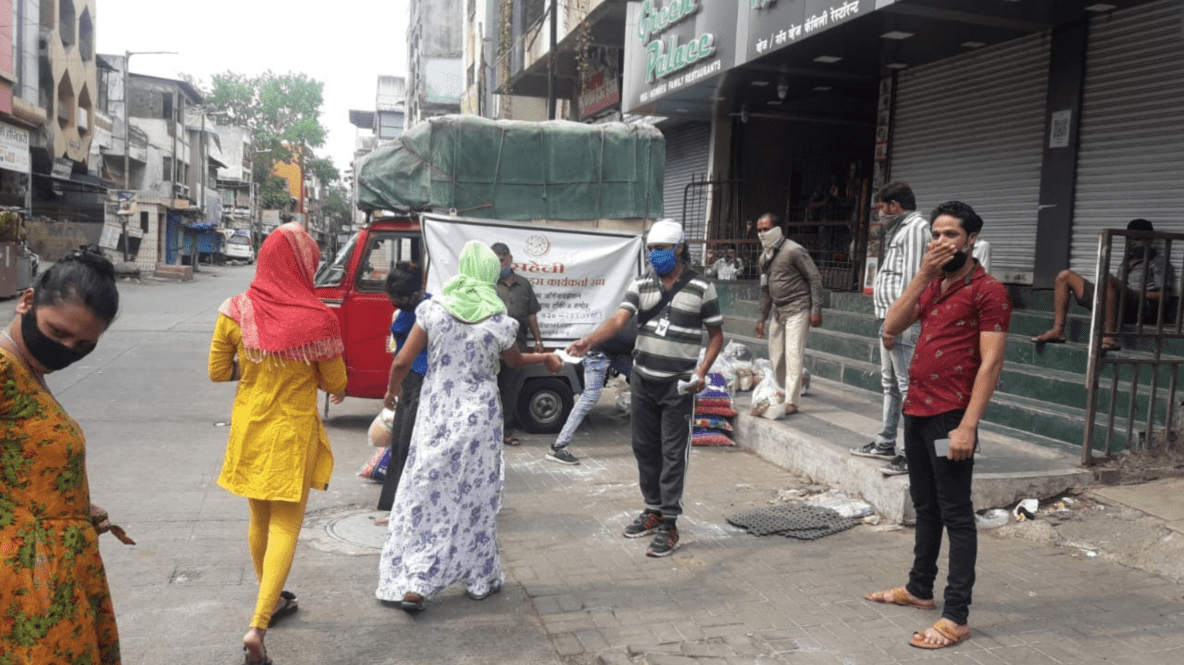As part of our ongoing series sharing COVID-19 response updates from Rise Up Leaders around the globe, Rise Up Leaders in India discuss the effects of the pandemic on their communities and their work to advance gender equity.
By Laila Mehta, Collective Impact Partnership Program Manager
India has the second-largest population in the world and has been under a nationwide lockdown since March 24th because of the health and safety concerns raised by the COVID-19 pandemic. As is happening all over the world, the pandemic is lifting the veil on systemic inequality and the vulnerability of large swaths of communities including migrant workers, women in the informal economy, survivors of domestic violence, sex workers, and women and children who are homebound. Throughout India, Rise Up Youth Champions and Leaders are poised to pivot their advocacy skills, innovative perspectives, and networks to meet the immediate needs of vulnerable communities, while also staying committed to making long-term change.
Rise Up Leaders in India are building and implementing advocacy strategies to improve outcomes for women and girls and creating innovative solutions to sexual and reproductive health, rights, and justice, economic, and education challenges. While few of us could have imagined a crisis as far-reaching and multi-faceted as COVID-19, Rise Up Leaders have the capacity, vision, and temerity to respond to the myriad health, security, safety, and other needs that are arising as the pandemic evolves and its impact deepens.
Leader responses have been edited for length and clarity.
Alicia Tauro
Program Coordinator, Youth for Unity and Voluntary Action (YUVA)
Rise Up Leader since 2019
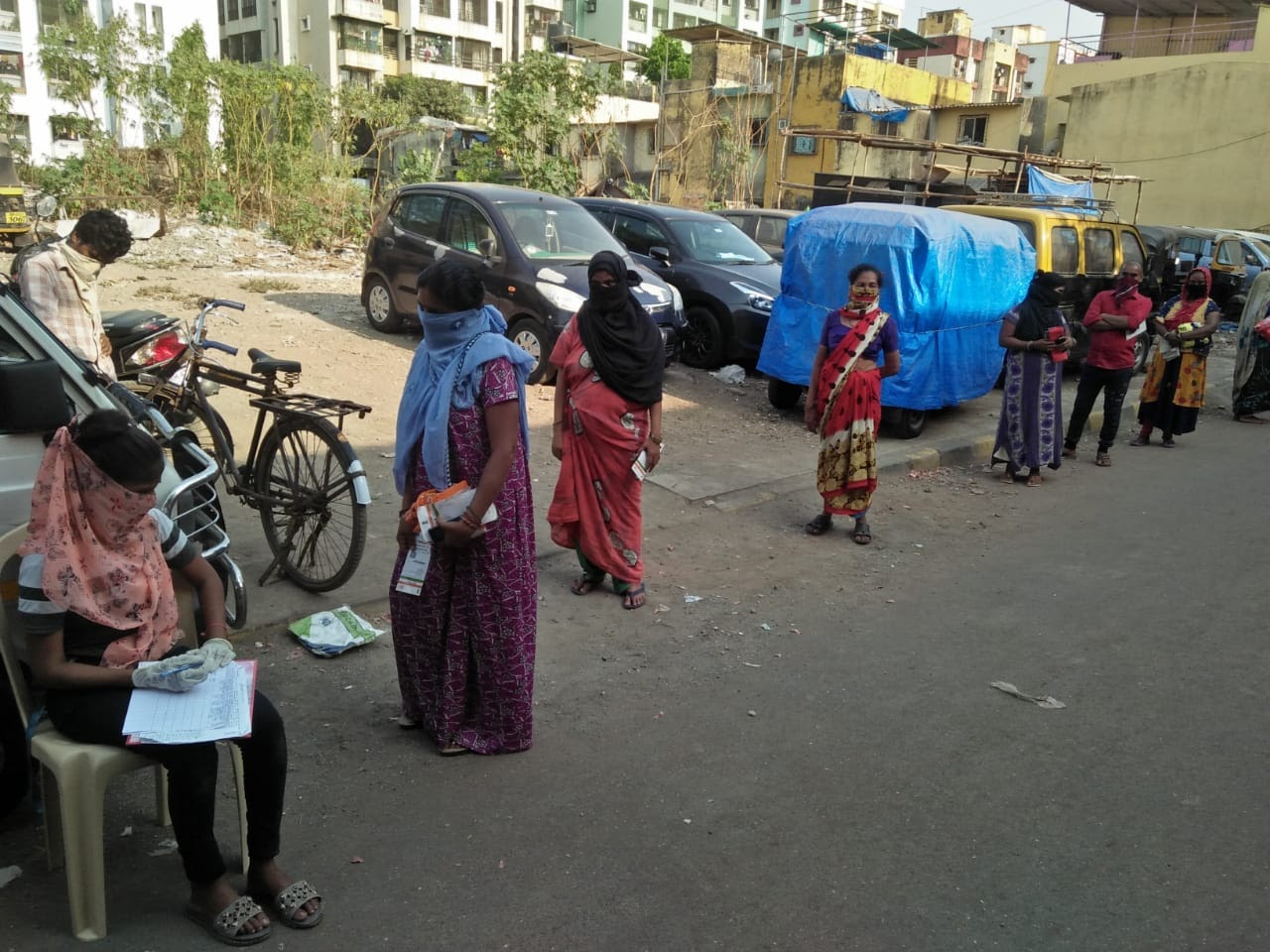
Photo of YUVA’s relief work provided by Rise Up Leader Alicia Tauro
“We have prioritized relief work and are working closely to help with the current migrant crisis. We have been distributing ration and hygiene kits to low-income communities and homeless settlements, as well as cooked food to frontline workers. Seven weeks of dedicated fundraising, daily distribution efforts, and robust partnerships have made it possible for us to provide 16,548 ration kits to more than 82,740 individuals in 6 cities across the Mumbai Metropolitan Region. We have also provided 835,000 cooked meals to frontline workers such as the Mumbai Police and government hospital staff, as well as to migrant workers and their families.
COVID-19 has hit the urban poor in ways that one could never imagine. It has shown the indispensable role that the informal sector plays as well as the unjust and unfair treatment being meted out to them, in a time when they need the government’s support the most. As a civil society organization, YUVA is trying hard to bridge this gap.”
Angana Prasad
Executive Director, Project KHEL
Rise Up Leader since 2017 (YCI)

Photos of Project KHEL’s relief work provided by Rise Up Leader Angana Prasad
“My work requires a lot of fieldwork, and since the schools closed, our access to the 1,200 children we work with was drastically cut without much of a warning. However, this lockdown has given us enough time to document all our learning and put together a 2-year curriculum. We have continued to be in touch and work with 27 of our youth coaches and leaders, via Whatsapp and Zoom calls. We work closely with this group via digital means, which is quite a challenge.
One of our greatest efforts has been in helping them understand fake news and how to identify it…Fake news is as real a threat as any virus: India is a diverse country, not just in its geography, culture, and food, but also in its access to information and processing of it. As the pandemic led to chaos across all social classes, a deluge of fake news came into existence and its outreach was way deeper and faster than even our preventive actions.
While everything around us is changing, the manner in which our youth leaders and coaches are responding, with empathy, a sense of urgency, and responsibility, is beautiful and absolutely commendable.”
Tania Echaporia
Director of Operations and Partnerships, Red Dot Foundation
Rise Up Leader since 2019
“Statistics show a sharp increase in the number of domestic violence cases in India across all the states. Staying locked inside the house is not always the safest option for marginalized groups – like women, girls, and members of the queer community. Additionally, a large section of women, girls, and children are completely dependent on informal labor which is currently the worst-hit sector.
Red Dot Foundation has seamlessly moved all its initiatives online and has adapted new initiatives keeping the current realities in mind. Safecity will be running a campaign called SafeCircle which will be a safe space for domestic violence survivors to come together as a community and share their stories and experiences. It will be a space to help those suffering from abuse and violence to find a community of support, facilitated by RDF and its mental health expert partners.
We have learned and observed that the marginalized communities are suffering the most in this global pandemic and that it is the duty of all social organizations to reach out to them. We are also learning about the importance of making virtual programs more accessible. We will advocate with the government for more digital literacy programs and availability of technology for the rural areas.”
Natty Inas Lopes
Assistant Director, Sakhya – Nirmala Institute
Rise Up Leader since 2019
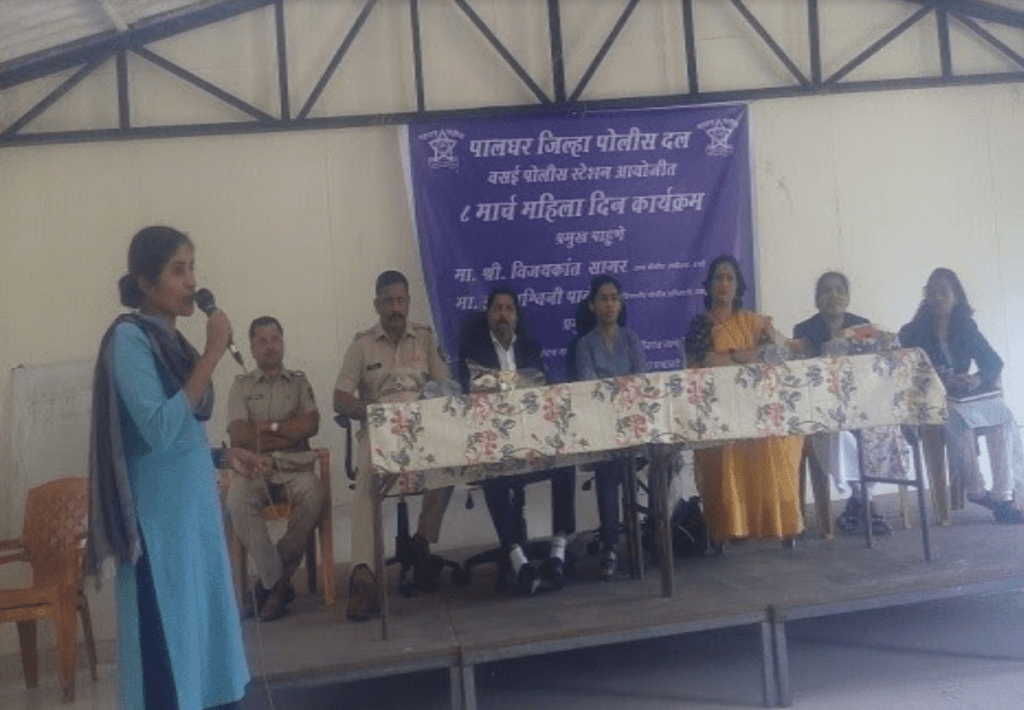
A stakeholder workshop hosted by the Nirmala Institute before the pandemic
“Domestic violence is prominent in society, and with the COVID-19 lockdown, its intensity has risen. Many victims are either not in a position to access helplines provided by government agencies and NGOs or are too afraid of their abusers, especially being in close proximity to them. Furthermore, the women who do report often face additional violence. Many married women who wish to go back to their maternal homes are unable to do so due to the distance and lack of transportation. Those who resort to taking refuge in shelter homes have to go through the process of getting the mandatory COVID-19 test done and observe quarantine with inadequate provisions…Since the courts are closed, the cases filed under the Domestic Violence Act for various reliefs such as injunction, protection, maintenance, child custody, etc. have come to a standstill.
We have built rapport with the police and protection officers who were part of our stakeholder workshops previously, and now they are helping us in our work during COVID-19. For example, one of the survivors of domestic violence we worked with during the lockdown was trying to get to safety. Her mother’s home was in another district several hours away by car and we were unable to give her shelter because government shelter homes do not have quarantine facilities. But with the help of the police, we were able to arrange for her to stay at a neighbor’s house for 14 days. Meanwhile, a local protection officer helped us to get the contact information of a protection officer in her mother’s district. Then 20 police officers helped this survivor to reach her mother’s home.”
Mahananda Chavan
Program Coordinator, Kamdhenu Social Organization
Rise Up Leader since 2018 (CIP)
“Violence against women is on the rise and women’s health problems are increasing. We are feeling disconnected because we cannot meet the community personally. We have collected rice, grains, and other food items and distributed it among slum dwellers and migrants. We are learning how to work in difficult times.”
Tejaswi Sevekari & Anu Kaimal
Executive Director & Advocacy Consultant, Saheli HIV/AIDS Karyakarta Sangh
Rise Up Leaders since 2019
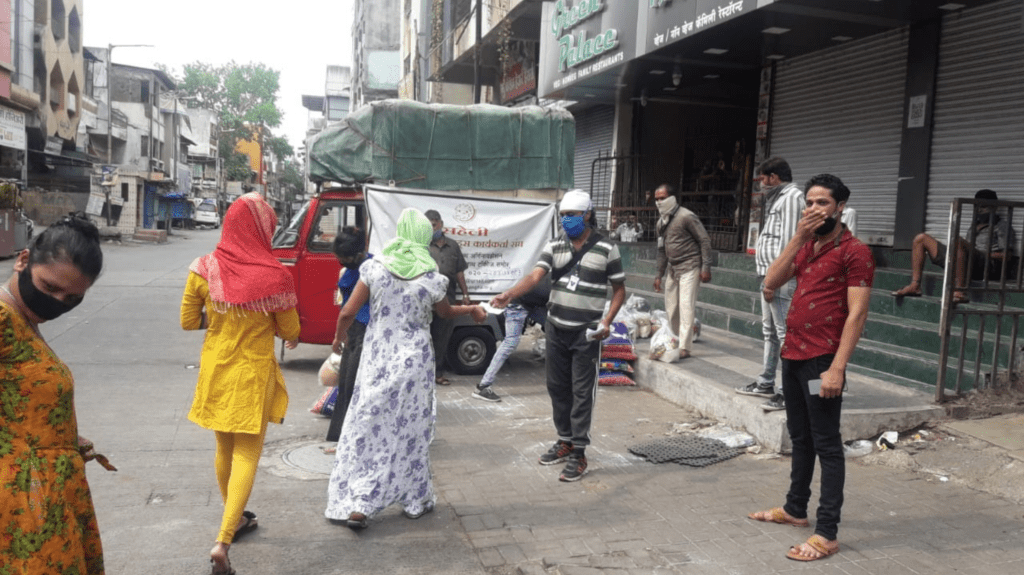
Image of Saheli Sangh’s community outreach provided by Rise Up Leaders Tejaswi Sevekari and Anu Kaimal
“Our priority shifted immediately to connecting with the community, more specifically the sex workers who face intersecting forms of discrimination and marginalization. During COVID-19, they’ve lost their earnings and have been cut off from essential services. We have reached out to 1,000 female sex workers and distributed ration kits and essential safety and hygiene supplies for one month.
The pandemic has given us a new purpose and thrown some big challenges our way, but it has also opened up new channels of interaction with different stakeholders, especially the local police. One example of this that is close to my heart is when a sex worker who was pregnant had to be taken to the hospital for her delivery and most transportation options were shut down due to lockdown, the police came to her rescue. She was taken to the hospital and she had a beautiful baby girl. We are extremely thankful to the policemen who stood by her.”
Minakshi Birajdar
President, Integrated Agriculture and Rural Development Organisation
Rise Up Leader since 2018 (CIP)
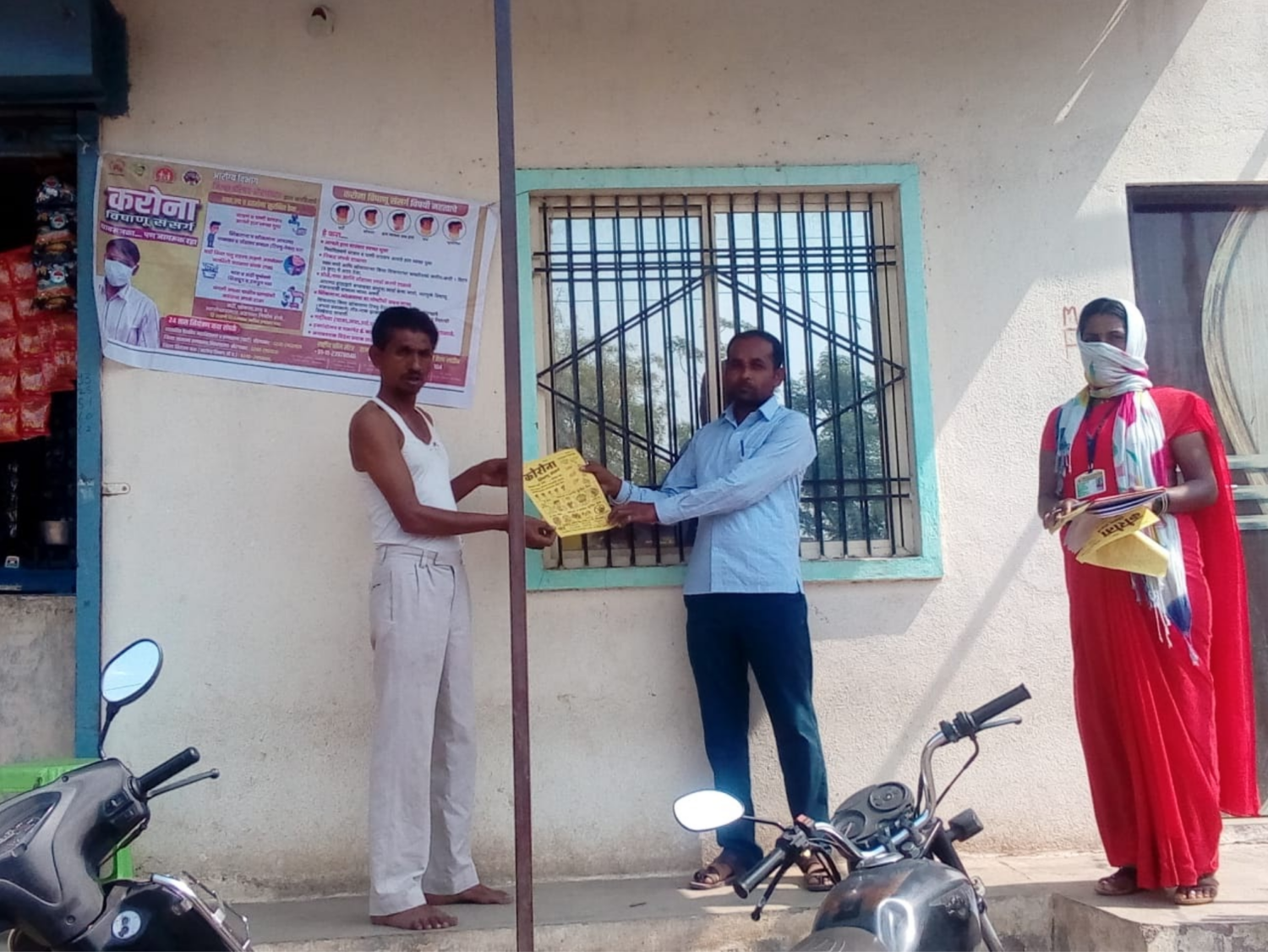
Photo provided by Rise Up Leader Minakshi Briajdar
“We have talked to women in the field. They told us that they are facing bigger problems at home. Everyone is sitting at home without work, without a livelihood, without money in hand, wondering, ‘How will we get the food, if we don’t even have a ration card?’
The government is giving some help; however, it won’t reach everyone, because few people have the documents needed. Therefore we have to face COVID-19 together. We will have to work hard post-COVID, too. I am hopeful that we will win the war against COVID-19.
To date, we have talked to 355 women, provided sanitary pads to 120 women, and rations to 52 women.”
For more information about Rise Up Leaders’ work please look out for the next blog on the Rise Up Leaders at the Frontlines series.

